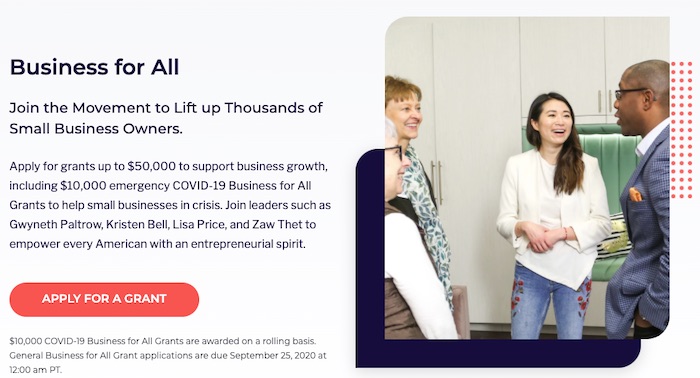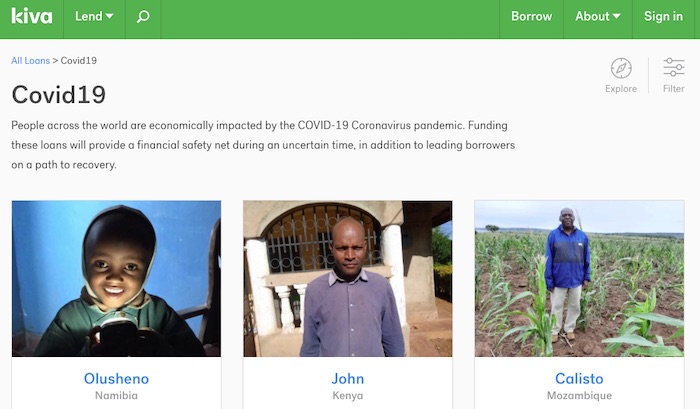The Paycheck Protection Program, the U.S. federal initiative to provide loans to small businesses, has mostly not reached the intended beneficiaries. There is not enough money, and loans to date have often gone to large companies. The second round is beset by problems as the Small Business Administration website cannot handle the volume of requests.
Small businesses may want to consider alternative funding sources to stay afloat. What follows are some options.
Business For All
In conjunction with Verizon and the fundraising site Hello Alice, Business For All is offering $10,000 emergency grants on a rolling basis to small businesses affected by Covid-19.

Business For All offers $10,000 emergency grants to small businesses affected by Covid-19.
Facebook has set aside $100 million in cash grants and ad credits for businesses hurt by Covid-19. Up to 30,000 eligible small businesses in more than 30 countries where Facebook operates will be able to receive the grant. To be eligible, a company must have:
- Two to 50 employees,
- Been in business for over one year,
- Experienced hardship from Covid-19,
GoFundMe
The reputation of GoFundMe, the crowdfunding site, has suffered because some of the campaigns have been scams, particularly by people asking for medical support. Recently GoFundMe implemented more rigorous practices. It now has a GoFundMe Guarantee that pledges a refund to donors if the campaign turns out to be a scam or funds are misused.
GoFundMe does not charge a platform fee for a campaign.
The company has established the Coronavirus Small Business Relief Initiative. All donations are collected and administered by GoFundMe.org, the advocacy and charitable division. Partners are Intuit QuickBooks, Yelp, GoDaddy, and Bill.com.
Small businesses can obtain a $500 matching grant provided they raise at least $500 from a GoFundMe campaign. To qualify for a matching grant, a business must show that it has been negatively impacted by a government mandate due to the pandemic. The business must be independently owned and operated, and the recipient must use the funds for employees or pay ongoing business expenses.
As of April 29, the related Small Business Relief Fund had collected $2,377,040 in donations — with 13,138 small businesses conducting a fundraiser. There are no limits on how much a business can raise, and even if the goal is not reached, the business receives all the money raised.
Kiva
Kiva, the non-profit micro-lending organization, makes loans primarily to small businesses in third-world countries. Kiva has an underwriting process and often makes loans in other countries via lender-partners (i.e., individuals, companies, organizations).
Kiva is now making direct loans to help small businesses in the U.S. and worldwide get through the Covid-19 crisis. The minimum amount from each lender is $25; most loans are funded by many lenders. The loans are interest-free and repaid monthly. U.S. loans have repayment terms between 30 and 42 months, depending on the loan amount.

Kiva is now making direct loans to help small businesses in the U.S. and worldwide get through the Covid-19 crisis.
Additional Resources
Many states and large cities are implementing grant and loan programs for small businesses. State and city websites should have the necessary information.
The Local Initiatives Support Corporation’s Rapid Relief and Resiliency Fund offers grants to minority and women-owned small businesses.
Sara Blakely is founder of Spanx, a female apparel company. Her “Spanx by Sara Blakely Foundation” donated $5 million to support female entrepreneurs and partnered with GlobalGiving (a non-profit) to establish The Red Backpack Fund, to make 1,000 grants of $5,000 each to female entrepreneurs in the U.S. affected by Covid-19.
Lines of Credit
For businesses that have revenue coming in but need money for inventory or other operational expenses, a line of credit from commercial lenders can help get through the crunch. Depending on credit scores and revenue, rates can be high, however.
Some banks are amending their usual line of credit terms to accommodate businesses that have suffered revenue losses as a result of Covid-19.
Otherwise, online funding sources include the following.
- Blue Vine offers lines of credit to businesses with low credit scores, but the interest rate can be quite high. It also offers term loans and invoice factoring and is an approved SBA lender for the Paycheck Protection Program.
- Kabbage has a streamlined application and decision process. It also is an approved SBA lender for the PPP; an application can be filled out on its website.
- OnDeck offers both lines of credit and, for lower interest rates, term loans. OnDeck is an approved SBA lender for the PPP, with an online application.







